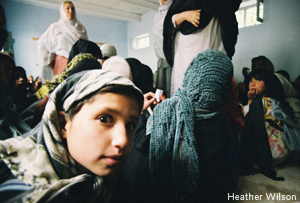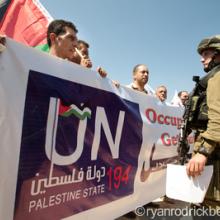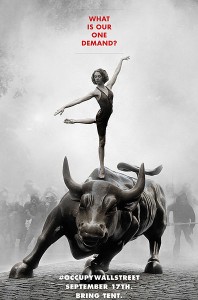UN
The June release of a Climate Vigil The Porter’s Gate Worship Project aims to nudge Christians toward climate action, but it isn’t alone among contenders to inspire the climate movement. For over 20 years, Carolyn Winfrey Gillette, a Presbyterian minister from New York, has written hymns for the times, including one for the 2021 UN climate talks held in Scotland and several to recognize increasing natural disasters such as wildfires, hurricanes, and floods. Fossil Free PCUSA, a campaign within the Presbyterian Church (USA) has used hymns in protests, including songs by Christian artist Matthew Black.
The latest IPCC report states that 3.3 to 3.6 billion people (nearly half of the world’s population) are “highly vulnerable” to climate risks like wildfires, heat waves, and rising sea levels. The report aims to prepare us for what’s likely and to give leaders a clear-eyed sense of urgency to implement solutions. But some may glance past its findings due to more immediate concerns. Others may be tempted to take a lifeboat mentality.
Yemen's warring sides agreed to free thousands of prisoners on Thursday, in what a U.N. mediator called a hopeful start to the first peace talks in years to end a war that has pushed millions of people on the verge of starvation. U.N. mediator Martin Griffiths told a news conference in a renovated castle outside Stockholm that just getting the warring sides to the table was an important milestone.

Image via bikeriderlondon / Shutterstock
Recognizing the incredible gap (between those with health insurance and those without it) in the health care system in their area, nurse practitioners Mary Wysochansky and Anna Stinchcum decided to do something to address the problem. These two women founded and opened the Sumter Faith Clinic in Americus, Ga. The clinic serves the uninsured and the underinsured in Sumter County, Ga. Funded purely by donations and staffed by volunteers, Sumter Faith Clinic provides healthcare for those in need that tends to the body, soul, and mind. Their desire to make justice happen was possible because these two women decided to join their efforts and work for a better future.
In 2014, the U.N. Women launched a campaign to revisit and reengage with the Beijing Declaration and Platform for Action on gender equality. The slogan of the campaign is “Empowering Women, Empowering Humanity, Picture It!” The platform identified 12 areas for attention in working for the rights of women and girls: Poverty, Education, Health, Violence, Armed Conflicts, Economy, Power/Decision-Making, Institutional Mechanisms for Advancement, Human Rights, Media, the Environment, and the “Girl-child.” At the original 1995 Beijing conference, 189 countries committed to this platform for achieving gender equality and female empowerment. Beijing +20 (twenty years after the Beijing Declaration) reminds us that, while advancements in gender equality and the empowerment of women have been made, there is still much work to do.
This week, more than 50 Christian leaders came together to voice our support for the framework of a Joint Comprehensive Plan of Action between Iran and the P5+1 nations (the United States, the United Kingdom, France, Russia, China, and Germany), concerning Iran’s nuclear program. Sojourners published the leaders’ statement as a full-page ad in Roll Call, a Washington, D.C., political newspaper widely read by members of Congress and their staff.
The statement, signed by leaders from all the major streams of American Christianity — Roman Catholic, evangelical, mainline Protestant, Orthodox, and Pentecostal — is reprinted below. We want to share this letter with you, the Sojourners community, and the broader public. I urge you to prayerfully consider adding your own voice in support of the diplomatic process and share the opportunity with others. Read it, discuss it in your churches, and add your name. This is a historic opportunity for diplomacy to triumph over armed conflict, and as people of faith, you can play an important role in helping the process succeed.
—Jim Wallis, Founder and President, Sojourners
For Christians, Easter is not just a day — it is a season, and, indeed, a way of life. This week is Easter: Monday, Tuesday, Wednesday, Thursday, and so on. Likewise, hope — the message of Easter — is not a feeling, but rather a decision — a choice we make day after day. Hope isn’t easy, but the decision to hope keeps the world going.
Now we have a choice to make: a decision whether to pursue a tough diplomatic process for peace to prevent Iran from developing a nuclear weapon. The United States and Iran — along with the U.K., Germany, France, Russia, and China — now have the beginning framework of a deal that could accomplish just that. But we would have to give it a chance. Much has to be worked out by the June 30 deadline, and it won’t be easy.
Should we give this hope for peace a chance? I believe Christians should answer yes. Here’s why.
LONDON — Eight of the 47 countries that hold seats on the United Nations Human Rights Council imprisoned people in 2013 under laws that restrict religious freedom, according to a new report from Human Rights Without Frontiers International, a nonprofit advocacy organization based in Belgium.
The eight UNHRC member states on the group’s second annual World Freedom of Religion or Belief Prisoners List, released Monday, are Morocco, China, and Saudi Arabia (whose new three-year terms begin Wednesday), and current members India, Indonesia, Kazakhstan, Libya, and South Korea.
Hundreds of believers and atheists were imprisoned in these and 16 other countries for exercising religious freedom or freedom of expression rights related to religious issues, according to the report. These rights include the freedom to change religions, share beliefs, object to military service on conscientious grounds, worship, assemble, and associate freely. Violations related to religious defamation and blasphemy are also included in the report.
On October 9, 2012, Pakistani teenager Malala Yousafzai was shot in the head by Taliban for advocating for girls' right to attend school. Malala survived the attack, and earlier this month she celebrated her 16th birthday by giving an impassioned speech to the United Nations, advocating for equal rights to education.
This 16-year-old girl was as eloquent and passionate as a seasoned statesman. Her words rang with truth and power. She reminded us that the world is full of vitriol and violence, hate and ignorance — that this is true for people of all faiths, all backgrounds, all political parties. That there is no corner untouched by darkness.
But at the U.N., celebrating her sweet 16, Malala was a light.
I listened to Malala’s story and got chills. As children, before we learned to use politics and policy to defend the lesser inclinations of the heart, we asked: why do people hate? Why do they do harm?
The U.S. climate change envoy proposed allowing countries to create their emissions reduction plans rather than working toward one goal. The U.S. hopes to bring more countries to the table and energize U.N. climate negotiations. The Guardian reports:
"Countries, knowing that they will be subject to the scrutiny of everybody else, will be urged to put something down they feel they can defend and that they feel is strong," Stern said from Berlin during a summit of environmental ministers focused on ways to advance the UN climate talks.
Read more here.
Delegates from around the world are meeting in Doha, Qatar this month to discuss United Nations’ climate policy. In the past, these meetings were a source of hope for the environmental movement, as governments came together and committed to reducing emissions to collectively try to halt climate change.
Unfortunately, that is no longer the case.
Remember the Kyoto Protocol? Even though the reductions it mandated were nowhere near what’s required for us to reverse the trend we’ve started, we haven’t even come close to achieving those reductions. Oh yeah, and the United States didn’t even sign it.
The Protocol is expiring this year, and the U.N. Framework Commission on Climate Change (the body that created the Protocol — stick with me here) is trying in Doha to extend it for a couple years until they can reach an agreement on how to move forward.
So what’s holding the discussions back?
On Nov. 29, Palestinians will bid to become a “non-member observer state” in the United Nations. If approved, this would be a major step toward full statehood for Palestinians. Israel, and perhaps more important, the United States, are against this move, not least for fear of possible war-crime investigations against Israel. Israel’s rationale has always been that a final resolution cannot be achieved unilaterally, but only through direct negotiations. Ironically, Israel achieved its own independence unilaterally and through the United Nations.
Palestinian Christians leaders have sent a strong message of support for this step. A statement signed by 100 community leader says:
We believe the Palestine Liberation Organization’s initiative to enhance Palestine’s status in the United Nations to an Observer State is a positive, collective, and moral step that will get us closer to freedom. This is a step in the right direction for the cause of a just peace in the region. We fully endorse this bid, just as we supported Palestine’s application for full membership of the United Nations a year ago.
NEW YORK — Manhattan was a traffic nightmare as the United Nations General Assembly was in session and security precautions ramped up.
Iran's president gave his usual insulting address. Israel's prime minister volleyed with dire warnings of Iran's nuclear-weapons intentions. Not much was expected of a session that was more political podium than problem solving.
But the event did underscore a reality that Americans often overlook: Not everything is about us. The world doesn't turn on a politician's latest line of attack. The fine points of Obamacare or Mitt Romney's 1040 or Paul Ryan's budget? Meh.
On the one hand, this unconcern is nothing unusual; hometown affairs are always of far more interest to locals than to anyone else. I could go months without caring about Kate Middleton's topless cavorting or political show trials in Beijing.
On the other hand, it is good to be reminded that we are one piece of a vast global mosaic. We connect with others but aren't necessarily the center.
Rather than proceed as a nation-level version of the "narcissistic princess" — as one reviewer labeled tell-all author Monica Lewinsky — we should pay more attention to the connections among us.
Editor's Note: The following is a transcript of President Barack Obama's remarks to the UN General Assembly in New York City on Tuesday, in which he condemns global violence and extremism, framing the speech around the recent tragedy at the U.S. consulate in Libya.
THE PRESIDENT: Mr. President, Mr. Secretary General, fellow delegates, ladies and gentleman: I would like to begin today by telling you about an American named Chris Stevens.
Chris was born in a town called Grass Valley, California, the son of a lawyer and a musician. As a young man, Chris joined the Peace Corps, and taught English in Morocco. And he came to love and respect the people of North Africa and the Middle East. He would carry that commitment throughout his life. As a diplomat, he worked from Egypt to Syria, from Saudi Arabia to Libya. He was known for walking the streets of the cities where he worked -- tasting the local food, meeting as many people as he could, speaking Arabic, listening with a broad smile.
Chris went to Benghazi in the early days of the Libyan revolution, arriving on a cargo ship. As America’s representative, he helped the Libyan people as they coped with violent conflict, cared for the wounded, and crafted a vision for the future in which the rights of all Libyans would be respected. And after the revolution, he supported the birth of a new democracy, as Libyans held elections, and built new institutions, and began to move forward after decades of dictatorship.
Chris Stevens loved his work. He took pride in the country he served, and he saw dignity in the people that he met. And two weeks ago, he traveled to Benghazi to review plans to establish a new cultural center and modernize a hospital. That’s when America’s compound came under attack. Along with three of his colleagues, Chris was killed in the city that he helped to save. He was 52 years old.

During interviews with more than a dozen Afghan women leaders, researchers, international aid workers and former Afghan government officials, we learned of persistent dangers and threats to the country's future.
Afghan women face continuing repression. They are witnessing the erosion of previous gains as Taliban control spreads in the countryside and reactionary warlord influence increases within the Kabul regime. The government's own security forces are often responsible for violations of women's rights. Check back in a few days for a more detailed account of what we learned.
The withdrawal of foreign forces will produce an economic crisis for the government of Afghanistan, which remains almost completely dependent financially on the U.S. and other foreign governments, especially to pay for its huge 300,000-person security forces. I wrote about this funding failure in an earlier post.
A new security agreement between Kabul and Washington is likely to call for the continued presence of U.S. military forces in the country beyond the 2014 transition deadline. This is seen as necessary to provide security for Kabul, but it could also have the effect of prolonging the insurgency and impeding prospects for reconciliation.
It was clear from what we heard that maintaining security requires more than deploying a large number of troops.
Finally, as President Obama has announced, this American war will soon be over, with most of the 44,000 American troops still in Iraq coming home in time to be with their families for Christmas.
The initial feelings that rushed over me after hearing the White House announcement were of deep relief. But then they turned to deep sadness over the terrible cost of a war that was, from the beginning, wrong; intellectually, politically, strategically and, above all, morally wrong.
The War in Iraq was fundamentally a war of choice, and it was the wrong choice.
Visit msnbc.com for breaking news, world news, and news about the economy
Where is the compassion in our economy and our politics? It says much of the economic system that Sojourners even needs to campaign for a "moral budget." How do we, as Christians, challenge structures that allow billions of dollars to be wasted via tax loopholes while 1 in 6 Americans live in poverty?
Will we, as Sachs hopes,
From the official statement by #OccupyWallStreet: "As one people, united, we acknowledge the reality: that the future of the human race requires the cooperation of its members; that our system must protect our rights, and upon corruption of that system, it is up to the individuals to protect their own rights, and those of their neighbors; that a democratic government derives its just power from the people, but corporations do not seek consent to extract wealth from the people and the Earth; and that no true democracy is attainable when the process is determined by economic power."
This Friday, October 7, 2011, marks 10 years since the United States invaded Afghanistan in the name of the "War on Terror." Sadly, this summer President Obama announced he'll continue our military presence in the country until 2014, and Congress has agreed to follow his lead.
Where do we go from here?
What's more obscene? Thirty-thousand children dead in Somalia in three months? Or the world standing by and letting it happen?












